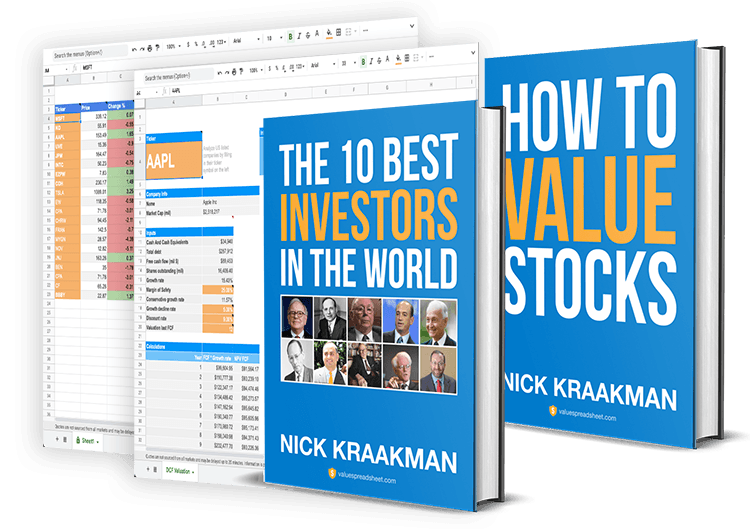Transcript
Hello everyone, and welcome back to the Value Investing Bootcamp podcast.
This is episode 13 already.
I'm your host, Nick Kraakman, and I want to thank you all, again, for tuning in, putting me in your earbuds.
I really, really appreciate all the comments and all the emails that I received from you guys.
It really motivates me to continue this series and give it my best.
So, thanks a lot, again, for tuning in and I really, really appreciate it guys.
Today we will discuss a very curious phenomenon on the stock markets, which is that small cap stocks tend to outperform large cap stocks.
So, what are small cap stocks?
Well, they are companies which have a market capitalization of less than 2 billion.
Market capitalization is simply the current stock price times the amount of shares that the company has on the stock market, and then you get the market capitalization, that's actually the price, so to say for the total company.
Big, large cap stocks, sometimes called Blue Chips, I don't know why that is, but that's what they're sometimes called, they have a market capitalization of around 10 billion or more.
So, as you can see, the small cap stocks are way, WAY smaller than the large cap stocks, and these small cap stocks tend to outperform the larger ones by a significant margin, actually.
So, why is this?
Well, this is because the smaller stocks are more often overlooked.
Many investors simply look at the S&P 500, or the Dow Jones, or the NASDAQ, whatever, but they don't really look at the tiny companies that are also floating around.
So, companies with their market caps between several million and 2 billion, like we just said.
These companies are often overlooked.
Not many analysts are following them, and the result is that they are more often mispriced than stocks which are highly followed by the masses, like an Apple, for example.
While I do believe that at this moment, Apple is still relatively cheap, big companies like that are less likely to be mispriced, because so many people are following them, analyzing them in excruciating detail.
So, yeah, there's more focus on them, and therefore the bigger companies are more often reasonably priced, while some of the smaller companies, they're just, you know, completely ignored and therefore, not many people know what they actually should be worth, and therefore mispricing occurs more often.
They are also considered more risky, because there's sometimes less information available for them, because the smaller companies might have just joined the stock exchange a couple of years ago, so there's only a couple of years of financial data available.
This is also for value investors a tricky situation, because we prefer to look at three to five years, or preferably 10 years of historical data, which is not always available for the smaller companies.
However, this also creates a big opportunity, because these companies, because their market is less liquid, so less people are trading them, this means that they can be highly volatile.
Sometimes they move up, the price movements are often bigger than with the larger companies.
This creates sometimes extremely attractive buying opportunities, because sometimes these prices just swing down and then you can get these companies at a very, very cheap price, which is great, of course, if you're a value investor.
It is also important to realize that all the big companies of today at some point started out as a small company.
So, you could say that the next Apple or Microsoft or whatever is somewhere among those small companies at this moment, you just don't know which one it will be.
That's the tricky part.
However, many of these small companies, when they're undervalued, they can often remain undervalued for a significant period of time, because sometimes they don't have much going for them, so to say.
They can be very boring business, nothing fancy, they're just making some money.
However, the only thing they have going for them is their intrinsic value.
So, they might be worth a lot of money, but people just don't see it.
They don't want to invest in it, because it's a boring, small, unknown, obscure company, and this shouldn't matter to you as a value investor.
Whenever you find a healthy, profitable company selling at a discount price, this should make you curious and actually investigate it, and pique your interest, because these are exactly the companies you want to be looking for.
According to Morningstar, which is morningstar.com, which is a very respected website for financial data and information, if you check that out, you can see that small cap stocks over the past 10 years returned around well, 10% per year, while large cap funds only returned 7% per year over the past 10 years.
This is a huge, huge difference, especially when you compare the growth stocks with value stocks.
There's a lot of research done on that subject.
I actually wrote my bachelor thesis on that subject, and there are just a lot of researchers that found that value stocks outperform growth stocks in the long run.
And if you also consider that small cap stocks tend to outperform large cap stocks, you can say that small value stocks offer the best opportunity for above average returns, so they are definitely something to look for.
I've also read some articles that suggest that small stocks which pay dividends have an even better chance of outperforming other stocks, so this is a very interesting category.
So, what I want to tell you is that you shouldn't just focus your attention on the big, well known companies, because they are less likely to offer you a bargain.
Definitely look for smaller companies as well, because they tend to be mispriced more often, they offer more attractive buying opportunities, more upside potential, because they still have so much room to grow.
However, it is more tricky to pick a winning small cap stock, because yeah, they still have to prove themselves.
Sometimes they just entered the stock market recently, and there's not much data to go on.
In that case, I would suggest to stay away from it, because you need at least some historical data, I'd say at least three years of historical data, to make some sort of a useful analysis of how the company is performing and how it might be performing in the future.
So, that's what I wanted to tell you today, and in the next episode I'll talk with you guys about what Warren Buffett calls stocks with an unbreachable moat, which just means a sustainable competitive advantage.
We'll talk about what that is, how you can spot it, and how you can take advantage of companies who have a sustainable competitive advantage, what their benefit is over companies who don't.
So, thank you very much again for listening, and I hope to see you in the next episode.
Have a great day!
If you enjoyed today's show, head over to ValueInvestingBootcamp.com to find out more on how you can invest like the pros, manage your own portfolio with confidence, and consistently earn mind boggling returns on the stock market.



